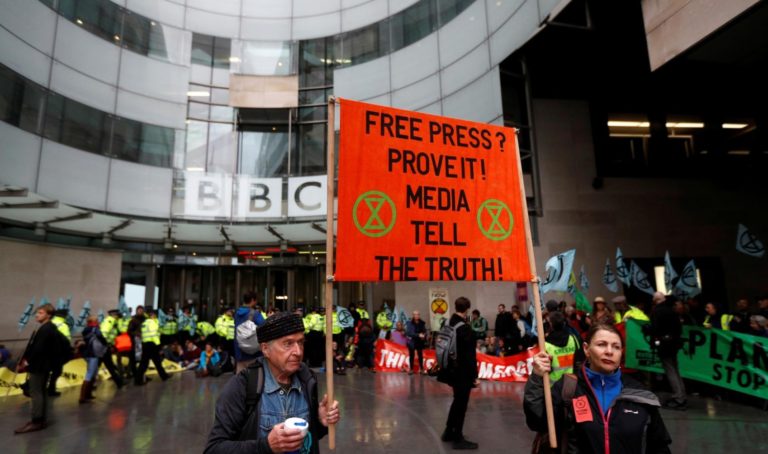The emergence of the Defund the BBC campaign and recent outcry in relation to the Last Night of the Proms are telling of two processes playing out in the U.K. Firstly, that rhetoric pertaining to peoples “right to British nationalism” is still increasing despite the U.K. now being in the process of leaving the EU.
Secondly, the status quo of an anachronistic and publicly-funded company is being challenged, as people question to what extent a media organisation can ever be unbiased. These open further discussion regarding the negative effects of having such an “impartial” institution as the public’s source for current affairs when simultaneously held by many of said public with mistrust and frustration.
Several weeks ago, I wrote a piece titled “Everything Wrong With the British Press’ Migrant Narrative.” I was frustrated by the BBC’s reporting of what is often referred to as the “migrant crisis,” finding the tone and language used by the presenters unconstructive and problematic. My criticism was directed at all big media conglomerates. But what makes the BBC more susceptible to criticism is its supposed impartiality.
The BBC has continued to portray itself as a non-biased media organisation for the benefit of educating the British public, but in reality, the BBC has not been considered as such for some time – a belief that has received more attention in recent times as a result of Brexit. However, who the BBC is biased against has been a contested matter.

This contestation and loss of faith in the BBC as a neutral broadcaster was evident in BMGresearch data, which concluded that only 37% of people felt that the BBC was neutral, placing it third after ITV and Channel 4. 18% of people felt that it was either strongly or somewhat biased to right-wing political opinion and 22% of people felt that it was strongly or somewhat biased to left-wing views. The difficulty in getting the “balance right” has been a subject of discussion, for example in an interview published in 2017 by The Spectator between the former editor of the BBC, Nick Robinson and former editor of The Spectator, Charles Moore, which touched on the disgruntlement of both political sides with BBC reporting.
Discussions about BBC impartiality have heightened because of Brexit. Some writers have been more sympathetic to the “balancing act” of the BBC, even claiming that it was “working hard to give pro-Brexit experts a helping hand,” while others have accused the BBC of being “anti-Brexit” and pushing a woke agenda.
In recent weeks these discussions have increased. For instance, there were recent claims by a right-wing media outlet that the BBC covered the BLM protests hypocritically when they did not give as much attention to instances of violence towards the police. There were also complaints of the BBC’s lack of impartiality following the Emily Maitliss covering of Dominic Cumming’s decision to drive from London to Durham.
The frustrations of the politically right, it would seem, have reached a boiling point, resulting in a surge of new support for the Defund the BBC campaign following the BBC announcement that this year’s broadcast for Last Night of the Proms would feature lyricless versions of the patriotic songs Rule, Britannia! and Land of Hope and Glory, hinting to concerns that the lyrics praise Britain’s imperial past.
The ensuing outrage is now being reported as one side of a culture war playing out in the U.K. between the political right-wing party supporters and left-wing party supporters, with the comments of Prime Minister Boris Johnson giving legitimacy to the anti-political correctness sentiment which has been rising in the U.K.
This is concerning. It has been suggested that it is connected to the “deep reluctance in Britain to confront pervasive inequality, as the outrage of commentators arises from nationalist rhetoric in which the removal of lyrics to historical nationalistic anthems is seen as a move in denying or shaming British national pride and heritage. This is a rhetoric that became normalised and acceptable during and following the campaign for Brexit. It has gained further traction during the BLM protests and the dismantling of historical statues.
The BBC hate everything we love about Britain. They are repelled by patriotism. They can't stand anyone who dares not vote Labour or Lib Dem. And they will never forgive Brexit voters for destroying their European fantasy. It is no longer fit for purpose https://t.co/XfKpe93t5f pic.twitter.com/YfMn7tY8zQ
— Dan Wootton (@danwootton) August 27, 2020
Generally, conversations about racism or Britain’s colonial history can be taken incredibly personally by some Britons who feel that such conversations are a personal attack on their own moral character and British identity. This narrative has also been fuelled by news outlets who reinforce the divisionary idea of the majority and the few “snobbish metropolitans” who, via the conduit of the BBC, are telling everyone else what they should think.
How one categorises another as “snobbish” is not entirely clear. Contrary to the language which insinuates that it has been the working class, far from the reaches of London, who were the majority in Brexit and rising nationalist rhetoric, 59% of leavers were in fact from middle-class backgrounds and 52% were southern. One distinguisher for being “snobbish” or “out of touch” may be carrying an expert title.
In a 2018 article, the UN expert report on racism was dismissed, the denial coming from the government itself. A dismissive nature toward expert opinion was normalised by government officials previously in relation to Brexit. The government, of course, has its own agendas, much like the press for legitimizing peoples opinions even if such opinions are in fact proven to be harmful.
Whilst the Defund the BBC campaign is not just connected to English nationalism, the amount of criticism it has received for its lack of impartiality, particularly in relation to Brexit, does support claims that it is exacerbating resentment – the leading factor in the rise of nationalism. There is a need for public dialogue in relation to structural racism in the U.K. and the emergence of fascist groups.
There is also a continued need for an honest look at how the media and government are affecting the public’s willingness to engage in an attitude of accountability and responsibility, including Britain’s imperial history. This includes investigating the BBC and how it may be counter-productive in diffusing this “division” of opinion and politics in the U.K.
Related Articles: Selective Empathy | Free Speech ‘Controversy’ | Media Bias as an Obstacle to Change
In fact, some investigations of the BBC suggest that it is not just a personal response to feel that the BBC does not work in the interests of the public. The report by the Institute of Economic Affairs (IEA) “Liberating the BBC from the licence fee,” pointed out that, “There is a long history of governments and incumbent vested interests restricting competition in broadcasting for their own ends,” and that, “Those interests have subtly changed the definition of public service broadcasting in a way that seems to serve producer interests rather than being helpful in informing good public policy debate.”
Those interests have subtly changed the definition of public service broadcasting in a way that seems to serve producer interests rather than being helpful in informing good public policy debate.
Resentment is only further fuelled by the monetary aspect which is non-optional if you own a television. The annual fee for a colour TV licence is £157.50, and even if you have a severe sight impairment you are only given a 50% discount. This is further problematized when you see news stories pertaining to the salaries of BBC presenters in contrast to articles about low-income individuals being summoned to court for not paying up.
This👇 pic.twitter.com/56kDp9Y7QC
— Christopher Hope📝 (@christopherhope) September 16, 2020
The Creative Diversity Network has also corroborated claims that the BBC’s apparent show of diversity is not quite what it seems. Out of five leading broadcasters in the U.K., the BBC in fact has the lowest percentage of off-screen workers from the BAME community, at just 9.6%. The lack of off-screen workers has been complained about previously, such as Lenny Henry’s complaint of fake diversity in 2017.
Whilst the BBC made an announcement to invest £100 million this year, following the BLM protests, the timing of its announcement coinciding with narratives which claim the BBC is preaching to the public may mean it has come too late. Such a step may be undermined and face constant criticism if it is viewed as an attempt at image-building rather than a genuine move toward equality. Whilst pledges to increase diversity off-screen are positive if such steps are deemed disingenuous and at the expense of the public, there is a higher chance of resentment growing around such progress.
It should be questioned why there has been such outrage regarding the Last Night of the Proms and why it has been given so much space in the U.K. news and social media. English nationalism has been an ongoing and growing trend which resulted in Brexit. Such sentiments need to be given serious attention and thought.
Furthermore, the arguments which support the Defund the BBC campaign are also deserving of some measured dialogue – to explore to what extent the BBC may, in fact, contribute to resentment, as it makes decisions which are perceived as having more to do with serving its own interests by presenting a particular image, than offering genuinely diverse and nuanced content.
Of course, this is the nature of all media outlets. Continued efforts to raise awareness about the factors which control media outlets are important, but the BBC as a public broadcaster should be the first to receive such criticism. A positive result of the Defund the BBC, if it is able to transcend divisionary political squabbling, would be a step toward having a louder and more public conversation about the bias and self-interest which exists in all media outlets.
Editor’s Note: The opinions expressed here by Impakter.com columnists are their own, not those of Impakter.com.
In the Featured Photo: A 2007 protest outside The BBC. Featured Photo Credit: Briantist











